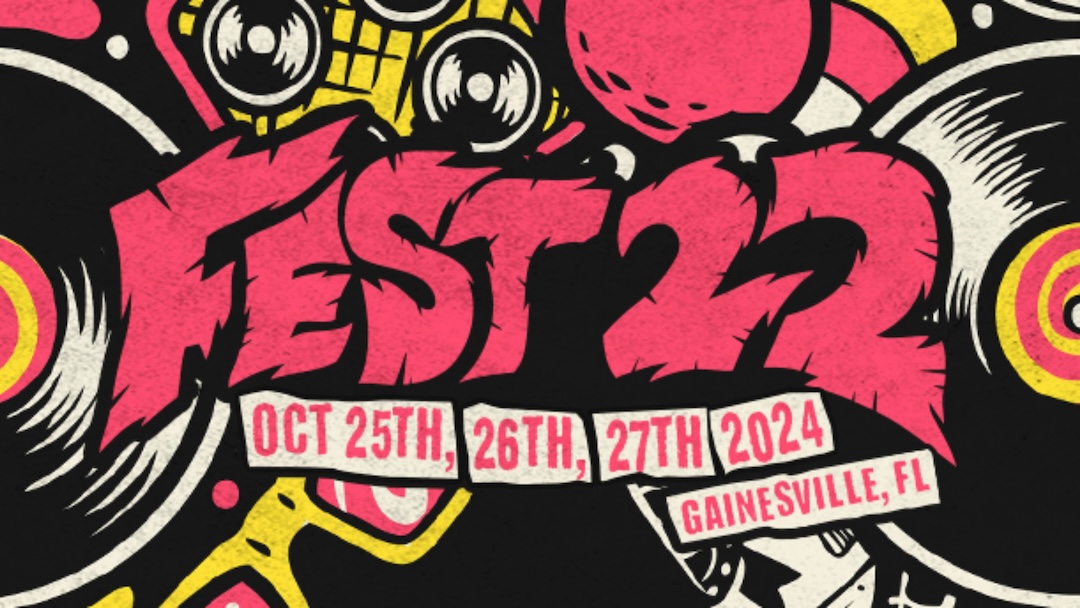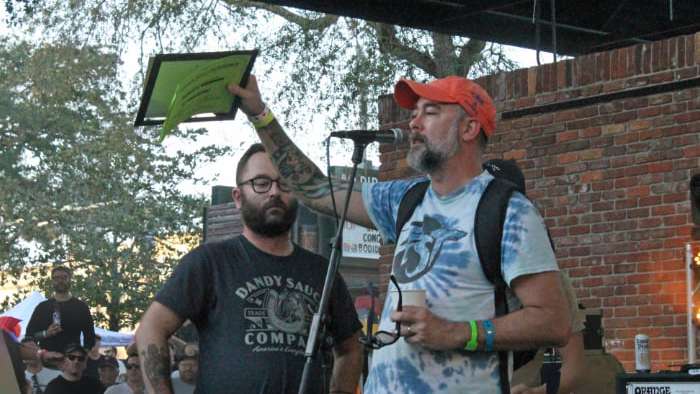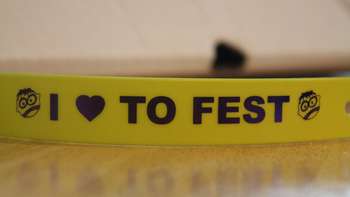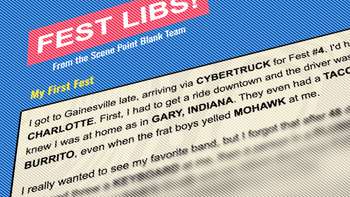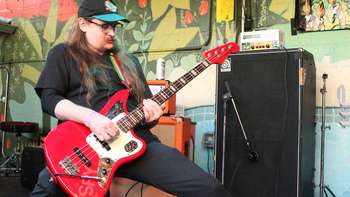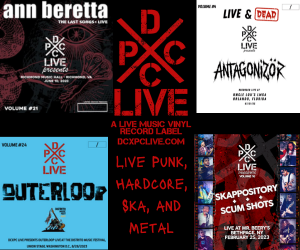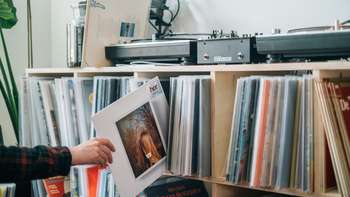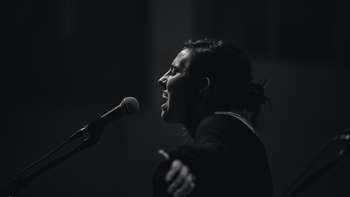Making something out of nothing every year.
FEST 22 takes place in Gainesville, FL this October 25-27. It’s rare for any musical venue to last that long, be it a festival, a venue or even a band. Obviously, a lot has changed in the world in that time, from band cycles to new technology to changing venues. And that doesn’t even touch on personal lives. Tony Weinbender, founder of The Fest and curator of its 350+ band lineup, has recently entered parenthood.
We caught up with Tony to talk about those Fest changes, who else works for The Fest year-round, and what it’s like to come home to his son after a 3-day party.
Scene Point Blank: This October is FEST 22. What is your first thought when you hear that number?
Tony Weinbender: That I’m getting old. [Laughs.]
It’s kind of baffling that it’s been going on for 22 years and that we’ve successfully been able to win people over with what we’ve planned, the bands we’ve booked, the way we operate, and the way we try to take care of everybody.
Just thinking back to the early start of Fest and why we put it on: trying to do something because me and some other friends were kind of stagnant and wanted to have some fun. And now it’s grown more into this large beast, but it still seems very DIY and manageable…It seems like there is festival upon festival upon festival in the US and all over the world now. Twenty-two years ago there weren’t many that did this kind of stuff, especially a multiple venue one that wasn’t just in a Knights of Columbus hall.
We put a lot of time and a lot of work into it and try to take care of the attendees first and foremost. I think that’s why we’re successful and are able to do this. We also don’t try to overachieve. Even though we have 350+ bands playing we still try to keep ticket sales down to 3,500 so it doesn’t seem overpacked. That’s the best advertisement I feel we can put out there: putting on a good experience for somebody so, when they leave, they tell their friends and they want to return as well.
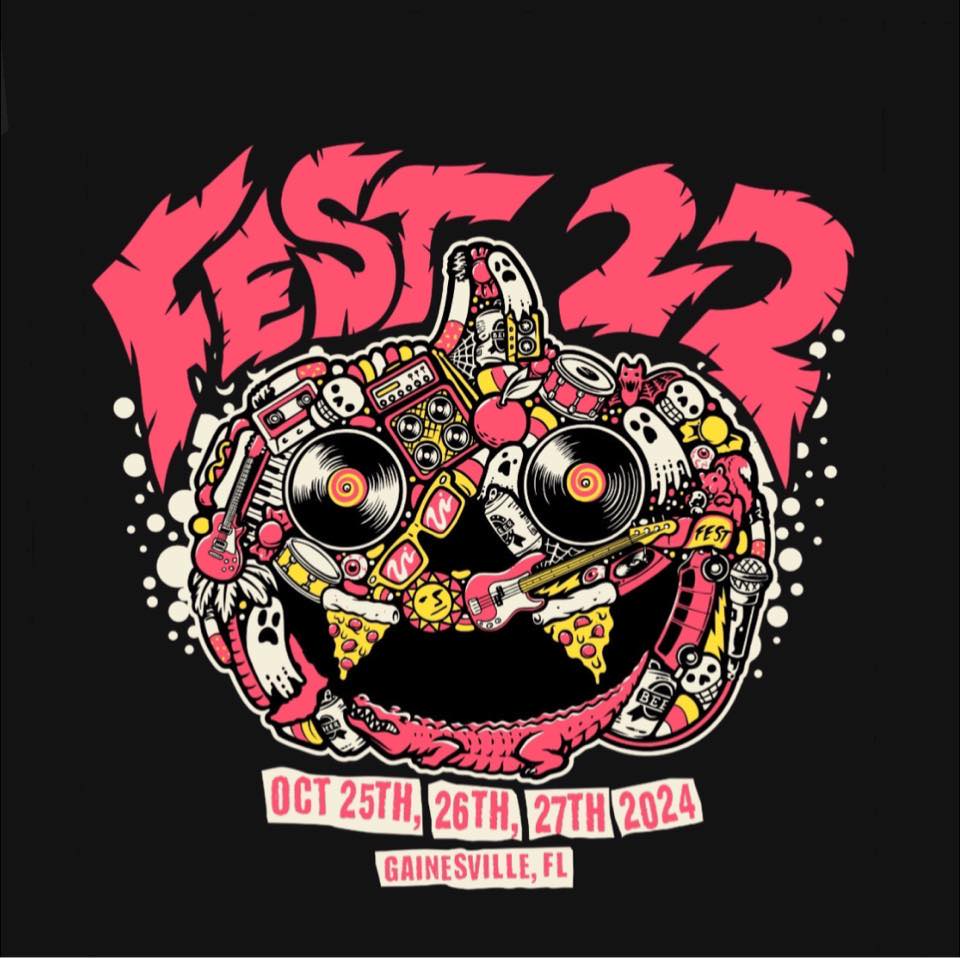
Scene Point Blank: Writing for Scene Point Blank I probably hear about another fest every week.
Tony Weinbender: It’s insane. And Gainesville has changed a lot in 20-some years. I moved here in 2000.
With High Dive closing, I don’t think there is any venue we’re using at Fest that we used at FEST 1. We don’t have that many full-blown music venues that exist all year round. So we try to have great relationships with businesses around town and try to make something out of nothing each year. That’s always stayed the same. In FEST 1 we only had one real music venue in town and now we only have, like, one real music venue in town. [Laughs.] There’s a restaurant that does shows occasionally or a place that’s an EDM/country music line dancing place that will let us take over and do punk shows once a year. That hasn’t changed how we plan Fest, but the landscape of Gainesville has changed in a lot of ways.
There are complete buildings that don’t exist anymore. The university bought the land and wiped out the whole lot. You walk by a space, “We used to do registration there and now it’s high rise apartments.” With High Dive closing down -- nobody really knows for certain, it’s been hush hush -- but everybody knows they’re going to demolish the building and put high rise apartments there. I don’t think somebody buys a piece of land that has an old pizza place in it and a 400 capacity music venue for $4.5 million with a plan of opening a pizza place and keeping the music venue…
When I was coming here in the ‘90s and when I moved here in the early 2000s, it was the Covered Dish. That changed when Common Grounds moved into a bigger location. It was a big part of Fest was when it was Common Grounds. Then, when Common Grounds stopped wanting to be a music venue, they sold it and it became High Dive. It was still very much a part of Fest. I feel like Fest attendees are going to be more saddened by it not being there than the Gainesville punks. A lot of Gainesville punks didn’t support High Dive as much as normal Gainesville people, but to High Dive’s credit they were very diverse with what they booked. There are a lot of different people in Gainesville over the years who have had experieces at High Dive, a cross section of different people who like music and comedy or Drunk Shakespeare or Rocky Horror Picture Show.
"A lot of these music festivals might be super well run compared to our ragtag bunch, but I don’t think they have the heart we do."
Scene Point Blank: I spent a lot of time on that patio.
Tony Weinbender: Yeah, the patio was awesome. I just went to, I think, my last show there: Sunny Day Real Estate. Fucking phenomenal. I also found myself going early and catching up with people and looking around saying, “Wow, it’s going to be weird it’s the last time I’m standing out here.” Two decades of experiences.
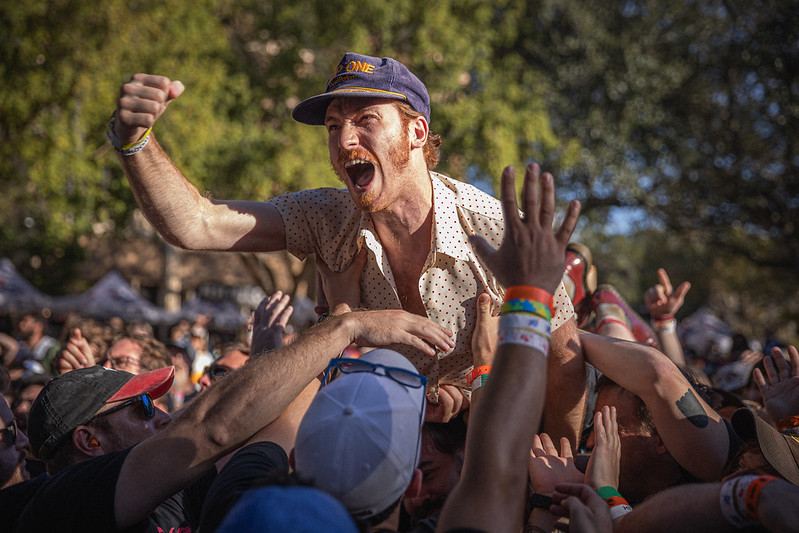
Scene Point Blank: Is Fest your full-time job now, and year-round?
Tony Weinbender: I would say part-time job. I have some other stuff I do that is not as punk related and now I am also a dad -- that’s a lot of work. For the first 10 years my income wasn’t from Fest. Now the bulk of my income that I live off is from Fest. Which is great. After doing Fest for 10 years, working tables, and working at No Idea Records, I decided to stop and focus 100% on Fest. When we did FEST 11 I had some savings, I said, “I’m not going to work other jobs and focus on this.” It really paid off. When you can put enough time and effort into something, you can really make it a better experience.
I am lucky. For 10 years I had to hustle and do other stuff. Now I’m able to support my family and do Fest, and help some other folks supplement their income by working for me.
Scene Point Blank: I know it’s a year-round job to chase sponsors and coordinate 350+ bands…
Tony Weinbender: …And manage my team. Some people work on it year-round, some don’t. Last night I had a meeting with the people that work at Bo Diddley Plaza. But they all have full-time jobs they do during the year that aren’t music related at all. We have to get together [and ask], “How did we do it last year?” We look at our notes: what do we need to change, what do we need to improve? Since we don’t put on a festival all year, we have to rely on good note-taking and rely on the fact that we all love this and want to do this. That’s great because when Fest weekend comes around, the people that do work on Fest work really hard. The volunteers, the staff and everybody, are not burned out. We’re excited and as enthusiastic as the attendees and the bands are. A lot of these music festivals might be super well run compared to our ragtag bunch, but I don’t think they have the heart we do. They are a production company that moves from festival to festival. Or even venues, a lot of times, they treat people like shit because they’re doing it every night. It loses its pizzazz. With Fest, we build it up yearround. It’s a party we’ve been planning all year so, when it happens, we are serious about it but we are trying to enjoy it as well.
The scene is still alive and there is all this new music that comes up and surprises the shit out of me every year.
Scene Point Blank: How many people are involved with Fest between volunteer and staff?
Tony Weinbender: We have over 500 volunteers. That varies year to year, depending on venues and hours and stuff. Volunteers can work a 6-8 hour shift with various jobs. For working that shift they get a pass for 3 days and a shirt nobody else gets (that we don’t sell). It’s also a good learning experience and it’s good to throw back to the community: you can be a part of this too. We are lucky to have a university here. A chunk of people that volunteer are college-aged kids, but a great chunk of them are dads and moms. We have people that are retired. Some people are diehard into the music scene, others think that this seems cool and want to be a part of it.
There are about 100 people that work Fest and get paid to work it. Out of that, probably less than 10 work on it all year round in some fashion, including myself.
I book the bands and, when I confirm a band, I pass it off to a person called The Band Wrangler. This year Randy Reddell, who plays in Dikembe, is taking that role. Randy, in previous years, was head of Bo Diddley Plaza’s set up and teardown production. When he moved to Michigan he started coordinating with hotels, and he handles sponsorships now. Randy touches more things than most people. Steve Wozniak does the website and the app. Scotty Swimba does all the core graphics and video editing. Scotty took on managing the video team, who documents product stuff too. This is stuff we work on all year. Niko Bacigalupo does all the social media stuff, all year as well. If there are things we need to discuss as a group, there are people in other parts of the States – sometimes the world – and we’ll bring them in for discussions about things. Especially when COVID was going on, we had to do a lot of Zoom talks: how are we going to operate this without fucking people over. What protocols do we need? How do we do this safely and not douchey like the rest of Florida. [Laughs.] Chris Grimstead in accounting does our books, so we are in talks all year about giving bands their deposits and things. There is a core group of people that work on it year round.
When it hits -- about September -- we pull in the stage managers, the people that manage volunteers, and do onsite training, meetings with Gainesville Police Department, Fire Rescue, and the Parks Department. The majority of the heavy lifting is what I do -- meeting with venues, contracts, bands, some of the bigger sponsorship stuff -- to make sure we’re still doing it the right way. The city is supporting us somewhat. We can make this thing work smoothly and safely in this tiny little town.
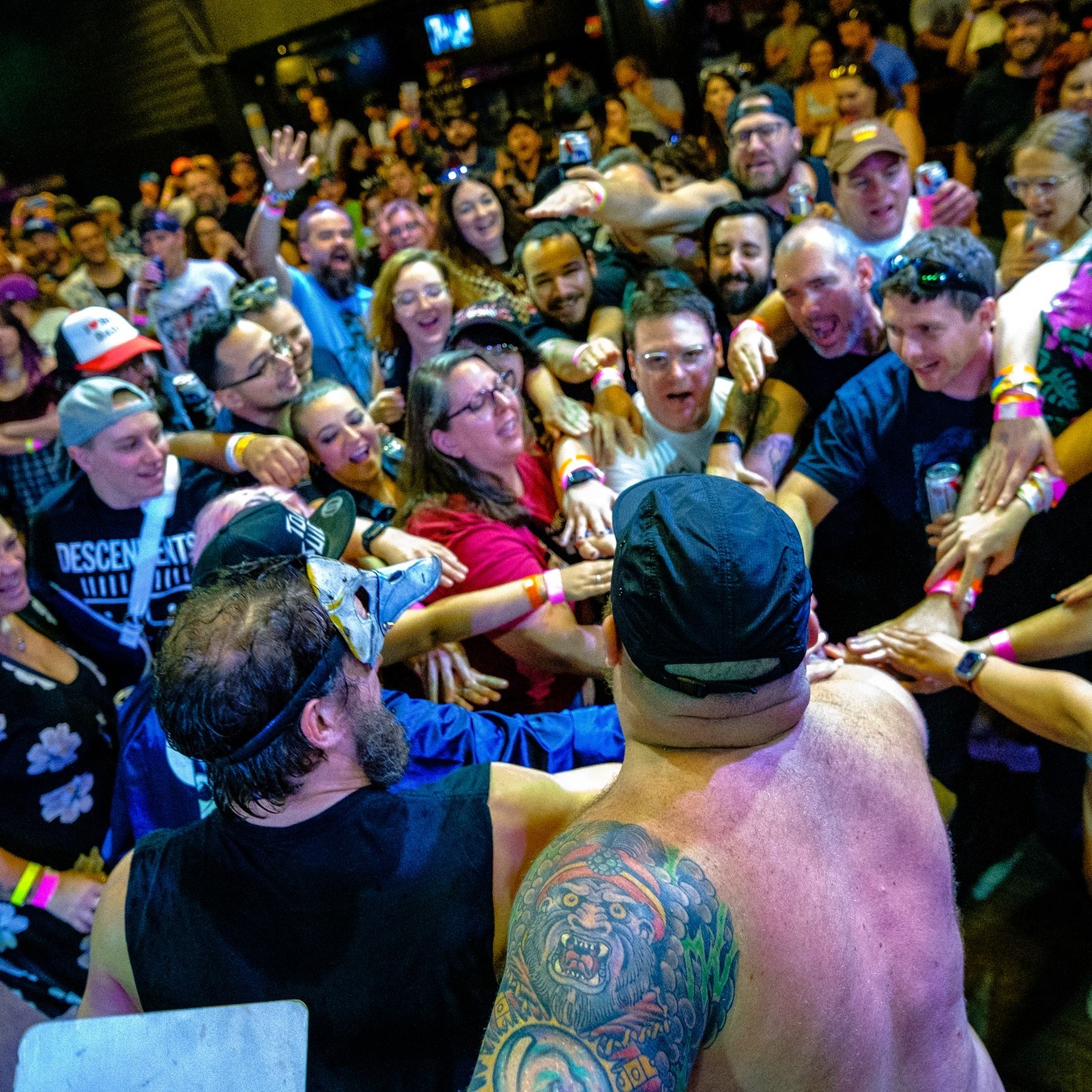
Scene Point Blank: So you still do the band approval: every band that plays gets the Tony stamp, so to speak?
Tony Weinbender: Nobody else books.
Scene Point Blank: I knew that was initially the concept but as it’s grown…How do you keep up? I can’t imagine how many submissions you’re getting.
Tony Weinbender: It’s definitely different than when we first started. I always have an invite list. A lot of it is old friends and family that have played Fest year after year: Hot Water Music and Bouncing Souls and old buds. But there is a list of new bands I listen to throughout the year. When the gates open and, “Hey, Tony is booking for Fest now,” I will get inundated with requests from bands and booking agents and labels. So I listen to them. And sometimes I’ll dig a little deeper. If it’s from a certain area I’ll reach out to a band I know in that area: are they nice people, are they doing stuff for the scene, are they douchey? It’s a little extra check, sometimes.
In the early years we would get physical tapes and cds in the mail with letters. That’s how we did the application process. We would work at No Idea and then, after hours, open the fridge, bet some beers, maybe a bottle of whiskey and smoke a joint and stay up ‘til 2 in the morning listening to bands and putting them in a yes bin and no bin. Cam Taylor (who worked Fest for a long time) [and I] handled publicity at No Idea and a bunch of smaller record labels. Those are some great memories of listening to bands and finding cool stuff. Now it’s more me. I listen to bandcamp links and stuff. I still love listening to new music. I love being exposed to new music. I think that’s something I take pride in about Fest. We overbook in a lot of ways and we give smaller bands a chance. I feel that we have more new and smaller bands than other music festival besides probably SXSW or something like that. I remember being in that small punk band and how much it meant if somebody put on a show for you.
It’s also sad, too, because we can’t book everybody. I might have made 200 bands happy and it’s their first time playing Fest and they’re stoked, but I probably disappointed 1,000 bands this year. And that’s a bummer. A lot aren’t even a no. “I like what you’re doing, I don’t have a spot for you right now, we filled up really quick. I’m going to put you on a backup list if you want to be on it. If somebody bails I’ll reach out to you if you can still make it.”
With High Dive closing that window of being able to add bands has gotten a lot slimmer because I had to rearrange things to take care of the bands we’d already confirmed to play High Dive.
Scene Point Blank: It’s one of the largest Fest venues.
Tony Weinbender: Capacity is 400. There are plenty of places to do smaller shows in Gainesville. We can make a venue out of anything. We’ve had New York delis with hardcore bands playing the floor. One year we had to take an abandoned part of a warehouse and do some shady wiring and clean it out. It smelled like hobo piss in there. We had a week to make it into a venue. We’ve done stuff in weird spots. We’re good at being creative and one of the cool things about punk rock is it’s not pretentious. If you’re in a small punk band you’ve played some weird places. I remember playing almost an independent version of ShowBiz Pizza and they did punk bands all the time in front of the ball pit. It was awesome.
Scene Point Blank: And somebody in the crowd knows how to work a PA.
Tony Weinbender: Exactly. As long as people are cool about it, that makes it fun too. I don’t freak out when stuff like this happens. Let’s take a breath, figure it out, make it work.
I feel kind of bad each year because I’m disappointing some bands. But, at the same time, I have enough bands wanting to play that I could do two Fests, if that makes sense. And I don’t want to do that. [Laughs]. But it gives me a good list for next year. And sometimes I have to ask bands: “You got to play two years in a row, why don’t you take a knee this year so I can open the door for somebody else?” Sometimes it feels like it’s a lot of the same bands but, when I start looking at the list and relistening to music from when I booked back in January, I get excited again. Part of me still feels like I’m writing for a zine or part of the college radio station, DJing and playing music for people. Even though I’m 47, I get jazzed on it. The scene is still alive and there is all this new music that comes up and surprises the shit out of me every year.
